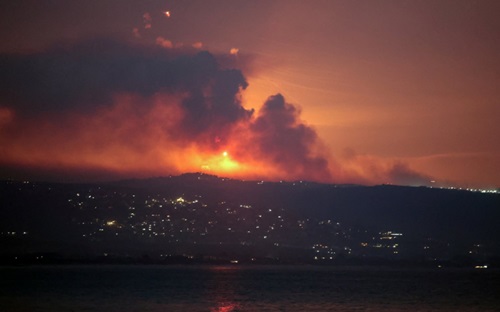Hezbollah launched hundreds of rockets and drones against Israel on Sunday in retaliation for the assassination of a senior commander in Beirut last month, the Iranian-backed movement said, as Israel's cabinet met to prepare a response.
The Israeli military said it had thwarted a much larger attack with pre-emptive strikes after it assessed that Hezbollah was preparing to launch the barrage.
Sunday's violence was among the biggest exchanges of fire since hostilities began between Israel and Hezbollah in parallel with the eruption of Israel's war against Palestinian group Hamas in Gaza.
Around 100 Israeli jets struck more than 40 Hezbollah launch sites in southern Lebanon shortly before the strikes, destroying thousands of launcher barrels that were aimed mainly at northern Israel but with some targets in central areas, the Israeli military said in a statement.
Hezbollah said it had launched drones and more than 320 Katyusha rockets towards Israel and hit 11 military targets. It said the barrage had completed "the first phase" of its response to Israel's assassination last month of Fuad Shukr, a senior commander, in Beirut but that the full response would take "some time".
It dismissed Israel's account of the pre-emptive strikes but said in a statement its military operation had been completed successfully for the day.
Expectations of an escalation between the two sides had risen since a missile strike in the Israeli-occupied Golan Heights last month killed 12 youngsters and the Israeli military assassinated Shukr in Beirut in response.
Israel's cabinet met at 7 a.m. (0400 GMT), Prime Minister Benjamin Netanyahu's office announced, but there were no immediate details on any further response from Israel.
"We are determined to do everything possible to defend our country, to return the residents of the north safely to their homes and to continue to uphold a simple rule: Whoever harms us – we harm him," Netanyahu said in a statement.
Foreign Minister Israel Katz said Israel would respond to developments on the ground but did not seek a full-scale war.
Most of the Israeli strikes were hitting targets in southern Lebanon but the military was ready to strike anywhere there was a threat, an Israeli military spokesperson said.
Gallant declared a state of emergency, and flights to and from Ben Gurion airport in Tel Aviv were suspended for around 90 minutes, but the airports authority said normal operations were expected to resume by 7 a.m.
Reuters





